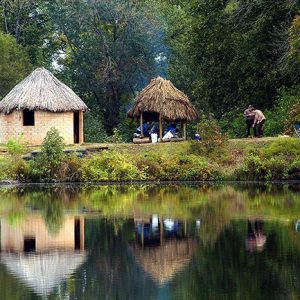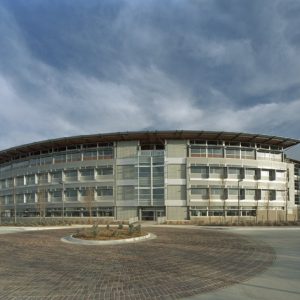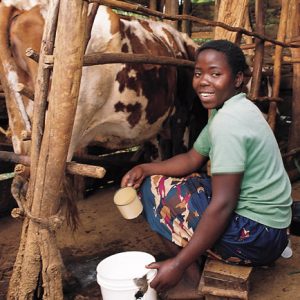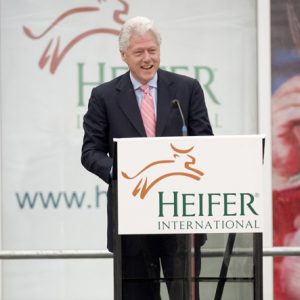calsfoundation@cals.org
Heifer International
Headquartered in Little Rock (Pulaski County), Heifer International is a non-profit organization whose mission is to work with communities to end hunger and poverty and to care for the earth. Since its founding in 1944, Heifer International has, through gifts of livestock and training, assisted eight and a half million families in more than 125 countries and thirty-eight U.S. states, including Arkansas.
Heifer International was founded by Dan West, an Indiana farmer and peacemaker. As a relief worker in an effort organized by three peace churches—the Society of Friends (Quakers), the Mennonites, and the Brethren—during the Spanish Civil War, West doled out cups of powdered milk to children displaced by the war. Each day, he saw the same faces in line for their ration of milk. West had an idea he summed up as: “Give them a cow, not a cup.” Giving families a cow would be a hand-up, offering children a regular supply of milk instead of just a chance at a limited daily handout. Upon his return to Indiana, he shared his idea with friends, fellow farmers, and members of the Church of the Brethren, who lent their support and encouraged the formation of Heifers for Relief.
In 1944, Heifers for Relief made its first shipment, seventeen heifers sent from Pennsylvania to Puerto Rico. Shipments soon followed to war-torn areas of Europe and Asia. The first U.S. project happened in Arkansas in 1949 with a gift of dairy cattle to twenty-five families in Cotton Plant (Woodruff County) and Pine Bluff (Jefferson County). Incorporated as Heifer Project in 1953, the organization expanded its reach to include South America and Africa and had already begun to provide a wider variety of livestock, including pigs, chickens, and goats.
In 1971, Heifer Ranch, nearly 1,200 acres of farmland west of Little Rock in Perry County, was purchased as a livestock center for the breeding, raising, and holding for shipment of animals. Up to this point, donated animals were held on small farms across the country until time for shipment. On a visit to W. E. Darby’s farm in Perry County, leaders had discovered that the land was for sale. Soon, the dream of a Heifer farm became reality, and after a five-year capital campaign, enough money had been raised to pay off the purchase of the ranch. Shortly thereafter, Heifer Project headquarters were set up in Little Rock, and in 1973, the organization changed its name to Heifer Project International.
By the early 1990s, Heifer Project International no longer shipped animals internationally from the U.S. but rather began purchasing livestock from improved local or regional breeds. Heifer Ranch (as well as Ceres Center in California and Overlook Farm in Massachusetts) then became a learning center where on-site programs offer visitors opportunities to learn about hunger and poverty and the work the organization does to address these global challenges. Until 2019, more than 28,000 visitors a year participated in individual and group experiential education activities at Heifer Ranch. Citing a shift in strategy, Heifer International announced in September 2019 that it was ending the public education program at its Heifer Ranch, including field trips and service learning, but continuing agricultural operations with an emphasis on helping farmers.
Heifer International’s first paid employee was Thurl Metzger. A farmer and teacher, Metzger became involved with Heifer in 1945 as a “seagoing cowboy,” a volunteer who accompanied and delivered animals during the period when livestock was shipped from the United States. Metzger worked for Heifer from 1951 to 1981 and served as the first executive director and the first director of international programs. His efforts were instrumental in converting Dan West’s ideas into action.
Under the leadership of president and CEO Jo Luck, Heifer International enjoyed tremendous growth. Over sixty percent of the organization’s nearly $100 million revenue comes from individual donors, with seventy-five percent of expenses going toward programmatic operations. Heifer employs about 270 workers in the United States and 650 overseas, as of October 2009. In fiscal year 2006, Heifer had 726 active projects, utilizing twenty-nine species of plants and animals, in fifty-seven countries and twenty-nine U.S. states with plans to assist directly and indirectly twenty-three million hungry and impoverished people by the decade’s end. In addition to the president/CEO, Heifer International is led by five senior vice presidents and is governed by a nineteen-person board of directors.
Building on its vision of a world of communities living together in peace and equitably sharing the resources of a healthy planet, much of Heifer International’s success comes from the signature practice of passing on the gift, whereby communities that have been helped in turn assist other needy communities. As people share the offspring of their livestock, along with their knowledge, resources, and skills, they create an expanding network of hope, dignity, and self-reliance. Passing on the gift ensures the sustainability of Heifer’s projects and makes recipients donors themselves.
Heifer International was honored as the recipient of the one-million-dollar Conrad N. Hilton Humanitarian Prize in 2004. The prize is the largest and most prestigious award given to organizations in recognition of efforts to alleviate human suffering around the world.
In March 2006, Heifer International dedicated its new world headquarters in downtown Little Rock just to the southeast of the Clinton Library. The 94,000-square-foot “green” building was constructed with Heifer’s commitment to care for the earth in mind and includes many environmentally sound features, such as a 25,000-gallon water tower that collects water from the roof to be used for toilets and to operate the building’s radiant heating system, bamboo flooring and recycled and recyclable carpeting, and insulation made of Arkansas soybeans and recycled jersey cotton. The building was designed to use half the energy of a comparable office building. Its innovative parking lot collects water for a constructed wetlands surrounding the office building.
The headquarters building is situated on thirty-three acres of filled swamp land that had been contaminated through years of industrial and rail use. Before construction began, Heifer facilitated Arkansas’s largest brownfield reclamation by removing 75,000 tons of contaminated soil. Heifer also recycled ninety-seven percent of the masonry from buildings that were torn down in clearing the site. Some of the masonry was crushed into gravel for use as fill, and some was cleaned by staff and volunteers for use as decorative pavers. Heifer International has applied for a Leadership in Energy and Environmental Design (LEED) certificate, a rating system by the U.S. Green Building Council, which recognizes high-performance green buildings.
On June 5, 2009, Heifer International opened a new facility attached to its headquarters building. The Murphy Keller Education Center included a set of interactive exhibits designed to educate visitors about the process of achieving self-sufficiency in various cultures of the world. The Heifer Village facility, intended to grow to include settings from communities around the world, also featured a conference center and an outdoor commons area. However, in the coming years, and especially following the COVID-19 pandemic, the nonprofit began to emphasize less its physical plant and, instead, worked to accommodate remote employees. On May 17, 2022, Heifer International announced plans to sell its Little Rock campus while remaining on the top two floors under a long-term lease.
For additional information:
Bradley, Matt, and Susan Bradley. The Gift: A World Solution to Hunger and Poverty. Little Rock: Bradley Press, 1998.
Heifer International. http://www.heifer.org (accessed November 15, 2022).
Plach, Eva. Relief on the Hoof: The Seagoing Cowboys, the Heifer Project, and UNRRA in Poland. Dekalb: Northern Illinois University Press, 2025.
Yoder, Glee. Passing on the Gift: The Story of Dan West. Elgin, IL: The Brethren Press, 1978.
Yount, Sheila. “Still Passing on the Gift: Heifer International at 80.” Arkansas Democrat-Gazette, July 14, 2024, pp. 1E, 3E. Online at https://www.arkansasonline.com/news/2024/jul/13/still-passing-on-the-gift-heifer-international-at/ (accessed July 15, 2024).
Sarah Donaghy
Heifer International








Comments
No comments on this entry yet.